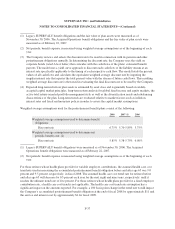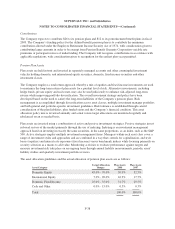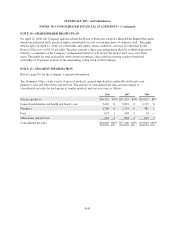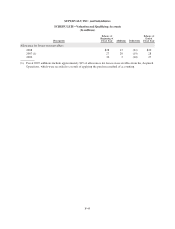Albertsons 2008 Annual Report Download - page 107
Download and view the complete annual report
Please find page 107 of the 2008 Albertsons annual report below. You can navigate through the pages in the report by either clicking on the pages listed below, or by using the keyword search tool below to find specific information within the annual report.SUPERVALU INC. and Subsidiaries
NOTES TO CONSOLIDATED FINANCIAL STATEMENTS—(Continued)
On October 13, 2000, a complaint was filed in Los Angeles County Superior Court (Joanne Kay Ward et al. v.
Albertson’s, Inc. et al.) alleging that Albertsons, Lucky Stores and Sav-on Drug Stores provided terminating
employees their final paychecks in an untimely manner. The lawsuit seeks statutory penalties. On January 4,
2005, the case was certified as a class action. In December 2007, the parties agreed to settle this matter, subject to
court approval. Based on the terms of settlement agreed to by the parties, the Company does not expect that the
ultimate resolution of this lawsuit will have a material adverse effect on the Company’s financial condition,
results of operations or cash flows.
On February 2, 2004, the Attorney General for the State of California filed an action in the United States District
Court Central District of California (California, ex rel Lockyer v. Safeway, Inc. dba Vons, a Safeway Company,
Albertson’s, Inc. and Ralphs Grocery Company, a division of The Kroger Co.) claiming that certain provisions of
the agreements (the “Labor Dispute Agreements”) between Albertsons, The Kroger Co. and Safeway Inc. (the
“Retailers”), which provided for “lock-outs” and revenue sharing in the event that any Retailer was struck at any
or all of its Southern California facilities during the 2003-2004 labor dispute in Southern California when the
other Retailers were not and contained a provision designed to prevent the union from placing disproportionate
pressure on one or more Retailer(s) by picketing such Retailer(s) but not the other Retailer(s) during the labor
dispute violate Section 1 of the Sherman Act. The lawsuit seeks declarative, injunctive and other legal and
equitable relief. On March 26, 2008, the parties filed a Stipulation and Request to Enter Final Judgment and, on
March 27, 2008, the Court entered Final Judgment. Under the Stipulation and Final Judgment, the Attorney
General abandoned any right to trial on its “per se” or “quick look” theories of liability under Section 1 of the
Sherman Act but preserved the right to appeal the Court’s summary judgment determination on this issue. The
Court also dismissed with prejudice the Attorney General’s claim that the revenue sharing provisions of the
Labor Dispute Agreements violated Section 1 of the Sherman Act based on a full “rule of reason analysis” and
the Attorney General abandoned any right to appeal this determination. Also under the Stipulation and Final
Judgment, the Court found that the non-statutory labor exemption to the antitrust laws does not immunize the
Labor Dispute Agreements from the Attorney General’s claims in this case, and the defendants reserve the right
to appeal this determination. Although this lawsuit is subject to uncertainties inherent in the litigation process,
based on the information presently available to the Company, management does not expect that any further
appellate resolution of this action will have a material adverse effect on the Company’s financial condition,
results of operations or cash flows.
In August 2004, a complaint was filed, later certified as a class action, in California Superior Court in and for the
County of San Diego (Sally Wilcox and Dennis Taber. v. Albertson’s, Inc.), alleging that Albertsons failed to pay
wages for time worked during meal breaks to its non-exempt employees employed in key carrier positions. The
lawsuit further alleges that Albertsons failed to provide itemized wage statements as required by California law
and that Albertsons failed to timely pay wages of terminated or resigned employees as required by California
law. The lawsuit further alleges a violation of the California Unfair Competition Law, Business and Professions
Code. The lawsuit seeks recovery of all wages, compensation and penalties owed the members of the class
certified, including compensation of one hour of pay for rest or meal period violations and wages for all time
worked while employees were clocked out for meal periods or required to remain on the premises during meal
periods. The lawsuit further seeks to recover all past due compensation and penalties for failure to provide
accurate itemized wage statements and to pay all wages due at time of termination for members of the class
certified with interest from August 6, 2000 to the time of trial. In December 2007, the parties agreed to settle this
matter, subject to Court approval. Based on the terms of settlement agreed to by the parties, the Company does
not expect the ultimate resolution of this lawsuit to have a material adverse effect on the Company’s financial
condition, results of operations or cash flows.
In Jonathan Johnson v. SUPERVALU INC. and Richfoods, Inc. (Circuit Court for the City of Richmond, VA), a
lawsuit filed in 2004 by the owner of Market Place Holdings, a five-store grocery store chain, Mr. Johnson
alleged that he suffered various medical problems and financial losses resulting from the Company’s alleged
F-41























